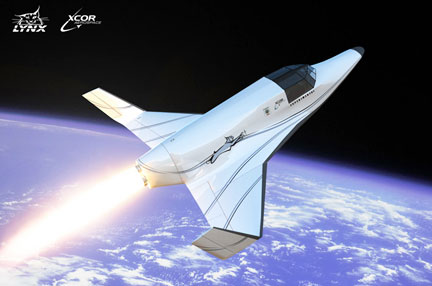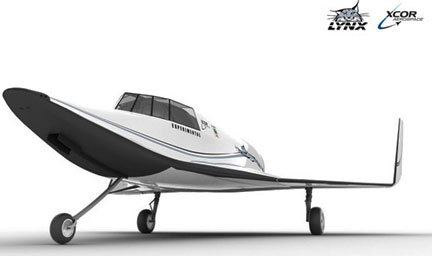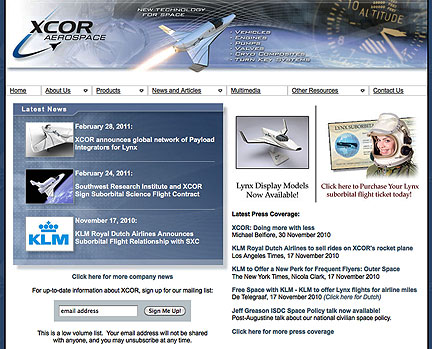At the commencement of the 2011 Next-Generation Suborbital Researchers Conference (NSRC) being held in Orlando, Florida, XCOR Aerospace announced its initial team of suborbital payload integration specialists who will begin taking orders and facilitating experiment development and integration for commercial, educational and government suborbital research missions aboard XCOR's Lynx reusable suborbital launch vehicle.

XCOR's Lynx suborbital launch vehicle
The first group of XCOR Lynx payload integration specialist firms include the following (in alphabetical order): the African Space Institute of Durban, South Africa; Cosmica Spacelines of Toulouse, France; NanoRacks of Lexington, Kentucky and Washington, D.C.; the Southwest Research Institute (SwRI) in Boulder, Colorado; Space Chariots in Oxon, England; Space Experience Curaçao of the Netherlands and the Caribbean island of Curaçao; Spaceflight Services in Tukwila, Washington, Valencia, California, and Huntsville, Alabama; and Yecheon Astro Space Center, Yecheon, South Korea.
Dr. Alan Stern, Associate Vice President at SwRI, the former NASA Associate Administrator for Science and the Chairman of the Commercial Spaceflight Federation's Suborbital Researchers Group, said, "We are extremely excited about the capabilities that Lynx will bring to our many research clients at SwRI, so much so that we've already procured six flights for our own pathfinder and discovery missions to better understand how we can best serve our clients. As a trained researcher and test engineer, I can't wait to fly with my experiments on Lynx and ring out the processes and procedures that will help our clients succeed, and help our Institute stay at the forefront of the 21st century."
 Each of the announced entities has entered into a Memorandum of Understanding (MOU) or contractual relationship with XCOR Aerospace creating a robust initial network of sales and payload integration specialist firms for the science, engineering, and education missions that will be flown on XCOR's Lynx suborbital reusable launch vehicle. Some see Lynx as a strong compliment to their existing business models or as a tool to develop critical national science and education capabilities or inspire new ways of thinking and execution of space based research. The XCOR payload integration specialist firms will support a variety of scientific, educational and engineering objectives including: atmospheric science, physics, microgravity research, planetary science, earth observation, life sciences, education and public outreach, and many others. Some firms such as NanoRacks already have capabilities on orbit at the ISS and will use Lynx as a qualification platform, others are teamed with launch services providers who have other on orbit resources like new commercial cargo and crew systems who will be using Lynx for pre-cursor missions. Each payload integration specialist firm will help facilitate and provision flight services on the Lynx by ensuring end users understand the packaging, environmental, safety, operational flight profile(s) and interface (physical, electrical and data) requirements of the Lynx for both automated experiments not requiring user intervention during flight, and those experiments when the scientist accompanies the payload to the edge of space. The integrators will provide a variety of additional value added services depending on their individual service offering and customer needs, including, but not limited to fabrication, test and qualification of experiments for the Lynx environment.
Each of the announced entities has entered into a Memorandum of Understanding (MOU) or contractual relationship with XCOR Aerospace creating a robust initial network of sales and payload integration specialist firms for the science, engineering, and education missions that will be flown on XCOR's Lynx suborbital reusable launch vehicle. Some see Lynx as a strong compliment to their existing business models or as a tool to develop critical national science and education capabilities or inspire new ways of thinking and execution of space based research. The XCOR payload integration specialist firms will support a variety of scientific, educational and engineering objectives including: atmospheric science, physics, microgravity research, planetary science, earth observation, life sciences, education and public outreach, and many others. Some firms such as NanoRacks already have capabilities on orbit at the ISS and will use Lynx as a qualification platform, others are teamed with launch services providers who have other on orbit resources like new commercial cargo and crew systems who will be using Lynx for pre-cursor missions. Each payload integration specialist firm will help facilitate and provision flight services on the Lynx by ensuring end users understand the packaging, environmental, safety, operational flight profile(s) and interface (physical, electrical and data) requirements of the Lynx for both automated experiments not requiring user intervention during flight, and those experiments when the scientist accompanies the payload to the edge of space. The integrators will provide a variety of additional value added services depending on their individual service offering and customer needs, including, but not limited to fabrication, test and qualification of experiments for the Lynx environment.
XCOR will be responsible for: (1) developing and periodically updating the Lynx interface control document, payload user's guide and other payload related processes and procedures in consultation with the payload integration specialists, end customers and regulators; (2) operating an annual Lynx payload user's group conference to solicit feedback and promulgate best practices across the payload integrators network and user community; (3) addressing any specific non-standard needs identified by payload integration specialists and their customers such as special flight trajectories or unique vehicle integration needs; (4) any special licensing or regulatory actions pertaining to the flight; and (5) with the integration specialist and customer, performing a final safety and pre-flight review meeting before the mission is flown and a de-briefing of the mission after flight.
On flight day, XCOR will receive payloads from the integration specialist (and/or customer), place it into one of the four cargo carrying locations on the Lynx, fly the payload on the mutually agreed upon trajectory, and return the payload to the researcher or payload integrator (as directed) within minutes of touchdown. From temporary airport-side storage or labs all the way to space and back to a runway-side lab is projected take under 30 minutes on a nominal flight with Lynx - a step function improvement over any capability available today and a strong compliment to other available systems. Depending upon customer needs, the Lynx can carry as small as a 1kg (or smaller) payload as a "ride share" or "secondary payload", and up to a 650kg large "primary" mission payload. Payloads may be carried as ride share or primary payloads in the Lynx pressurized cabin or be exposed to the unpressurized and harsh conditions of space. In the future, small nanosatellites may also be launched from the Lynx vehicle using an expendable upper stage launcher of XCOR design allowing innovative low earth orbit satellite applications, constellations, and the testing of new and advanced technologies to be used on larger satellites and manned flight vehicles.
Andrew Nelson, XCOR's Chief Operating Officer added, "with the lowest cost of operations in the marketplace, ability to fly multiple times daily from sites around the world using our affordable 'wet lease' customer model, and our global reach with these trail blazing space entrepreneurs, Lynx is poised to become the de facto standard in suborbital reusable launch vehicle payloads for scientific, education and engineering purposes, and create high paying technical job clusters not only in the US, but everywhere Lynx operates."


